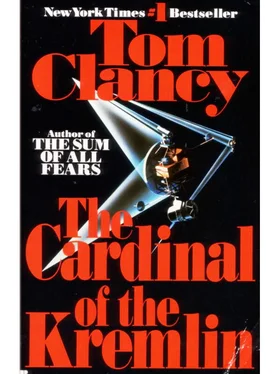Tom Clancy - The Cardinal of the Kremlin
Здесь есть возможность читать онлайн «Tom Clancy - The Cardinal of the Kremlin» весь текст электронной книги совершенно бесплатно (целиком полную версию без сокращений). В некоторых случаях можно слушать аудио, скачать через торрент в формате fb2 и присутствует краткое содержание. Год выпуска: 1988, Жанр: Триллер, на английском языке. Описание произведения, (предисловие) а так же отзывы посетителей доступны на портале библиотеки ЛибКат.
- Название:The Cardinal of the Kremlin
- Автор:
- Жанр:
- Год:1988
- ISBN:нет данных
- Рейтинг книги:3 / 5. Голосов: 1
-
Избранное:Добавить в избранное
- Отзывы:
-
Ваша оценка:
- 60
- 1
- 2
- 3
- 4
- 5
The Cardinal of the Kremlin: краткое содержание, описание и аннотация
Предлагаем к чтению аннотацию, описание, краткое содержание или предисловие (зависит от того, что написал сам автор книги «The Cardinal of the Kremlin»). Если вы не нашли необходимую информацию о книге — напишите в комментариях, мы постараемся отыскать её.
The Cardinal of the Kremlin — читать онлайн бесплатно полную книгу (весь текст) целиком
Ниже представлен текст книги, разбитый по страницам. Система сохранения места последней прочитанной страницы, позволяет с удобством читать онлайн бесплатно книгу «The Cardinal of the Kremlin», без необходимости каждый раз заново искать на чём Вы остановились. Поставьте закладку, и сможете в любой момент перейти на страницу, на которой закончили чтение.
Интервал:
Закладка:
"Guess I have time for a nap," the Colonel said on his way to the door. He closed it and walked aft, past the telescope assembly to the main cabin. Why was it that the crews doing the flying now were so damned young? They probably think I need a nap instead of being bored to death.
Forward, the pilot and copilot shared a look. Old fart doesn't trust us to fly the goddamned airplane, does he? They adjusted themselves in their seats, letting their eyes scan for the blinking lights of other aircraft while the autopilot controlled the aircraft.
Morozov was dressed like the other scientists in the control room, in a white laboratory coat adorned with a security pass. He was still going through orientation, and his assignment to the mirror-control team was probably temporary, though he was beginning to appreciate just how important this part of the program was. In Moscow, he'd learned how lasers work, and done some impressive lab work with experimental models, but he'd never truly appreciated the fact that when the energy came out the front of the instruments the task had only begun. Besides, Bright Star had already made its breakthrough in laser power.
"Recycle," the senior engineer said into his headset.
They were testing the system calibration by tracking their mirrors on a distant star. It didn't even matter which star. They picked one at random for each test.
"Makes one hell of a telescope, doesn't it?" the engineer noted, looking at his TV screen.
"You were concerned about the stability of the system. Why?"
"We require a very high degree of accuracy, as you might imagine. We've never actually tested the complete system. We can track stars easily enough, but…" He shrugged. "This is still a young program, my friend. Just like you."
"Why don't you use radar to select a satellite and track on that?"
"That's a fine question!" The older man chuckled. "I've asked that myself. It has to do with arms-control agreements or some such nonsense. For the moment, they tell us, it is enough that they feed us coordinates of our targets via land-line. We do not have to acquire them ourselves. Rubbish!" he concluded.
Morozov leaned back in his chair to look around. On the other side of the room, the laser-control team were shuffling about busily, with a flock of uniformed soldiers behind them whispering to themselves. Next he checked the clock – sixty-three minutes until the test began. One by one, the technicians were drifting off to the rest room. He didn't feel the need, nor did the section chief, who finally pronounced himself satisfied with his systems, and placed everything on standby.
At 22,300 miles over the Indian Ocean, an American Defense Support Program satellite hung in geosynchronous orbit
over a fixed point on the Indian Ocean. Its huge cassegrain-focus Schmidt telescope was permanently aimed at the Soviet Union, and its mission was to provide first warning that Russian missiles had been launched at the United States. Its data was downlinked via Alice Springs, Australia, to various installations in the United States. Viewing conditions were excellent at the moment. Almost the entire visible hemisphere of the earth was in darkness, and the cold, wintry ground easily showed the smallest heat source in precise definition.
The technicians who monitored the DSPS in Sunnyvale, California, routinely amused themselves by counting industrial facilities. There was the Lenin Steel Plant at Kazan, and there was the big refinery outside Moscow, and there –
"Heads up," a sergeant announced. "We have an energy bloom at Plesetsk. Looks like one bird lifting off from the ICBM test facility."
The Major who had the duty this night immediately got on the phone to "Crystal Palace," the headquarters of the North American Aerospace Defense Command – NORAD – under Cheyenne Mountain, Colorado, to make sure that they were copying the satellite data. They were, of course.
"That's the missile launch they told us about," he said to himself.
As they watched, the bright image of the missile rocket exhaust started turning to an easterly heading as the ICBM arced over into the ballistic flight path that gave the missile its name. The Major had the characteristics of all Soviet missiles memorized. If this were an SS-25, the first stage would separate right about… now.
The screen bloomed bright before their eyes as a fireball six hundred yards in diameter appeared. The orbiting camera did the mechanical equivalent of a blink, altering its sensitivity after its sensors were dazzled by the sudden burst of heat energy. Three seconds later it was able to track on a cloud of heated fragments, curving down to earth.
"Looks like that one blew," the sergeant observed unnecessarily. "Back to the drawing board, Ivan…"
"Still haven't licked the second-stage problem," the Major added. He wondered briefly what the problem was, but didn't care all that much. The Soviets had rushed the -25 into production and had already begun deploying them on railcars for mobility, but they were still having problems with the solid-fuel bird. The Major was glad for it. It didn't take a great degree of unreliability in missiles to make their use a very chancy thing. And that uncertainty was still the best guarantee of peace.
"Crystal Palace, we call that test a failure at fifty-seven seconds after launch. Is Cobra Belle up to monitor the test?"
"That's affirmative," the officer on the other end replied. "We'll call them off."
"Right. 'Night, Jeff."
Aboard Cobra Belle, ten minutes later, the mission commander acknowledged the message and cut off the radio channel. He checked his watch and sighed. He didn't feel like heading back to Shemya yet. The Captain in charge of the mission hardware suggested that they could always use the time to calibrate their instruments. The Colonel thought about that one and nodded approval. The aircraft and crew were new enough that everyone needed the practice. The camera system was put in the MTI-mode. A computer that registered all the energy sources the telescope found began to search only for targets that were moving. The technicians on the screens watched as the Moving-Target Indicator rapidly eliminated the stars and began to find a few low-altitude satellites and fragments of orbiting space junk. The camera system was sensitive enough to detect the heat of a human body at a range of one thousand miles, and soon they had their choice of targets. The camera locked on them one by one and made its photographic images in digital code on computer tape. Though mainly a practice drill, this data would automatically be forwarded to NORAD, where it would update the register of information of orbiting objects.
"The power-output breakthrough you've made is breathtaking," Colonel Bondarenko said quietly.
"Yes," General Pokryshkin agreed. "Amazing how that happens, isn't it? One of my wizards notices something and tells another, who tells another, and the third says something that works its way back to the first, and so on. We have the best minds in the country here, and still the discovery process seems about as scientific as stubbing your toe on a chair! That's the odd part. But that's what makes it so exciting. Gennady Iosifovich, this is the most exciting thing I've done since I won my wings! This place will change the world. After thirty years of work, we may have discovered the basis of a system to protect the Rodina against enemy missiles."
Bondarenko thought that was an overstatement, but the test would demonstrate just how much of an overstatement. Pokryshkin was the perfect man for this job, however. The former fighter pilot was a genius at directing the efforts of the scientists and engineers, many of whom had egos as large as a battle tank, though far more fragile. When he had to bully, he bullied. When he had to cajole, he cajoled. He was by turns the father, uncle, and brother to all of them. It took a man with a large Russian heart to do that. The Colonel guessed that commanding fighter pilots had been good training for this task, and Pokryshkin must have been a brilliant regimental commander. The balance between pressure and encouragement was so hard to strike, but this man managed it as easily as breathing. Bondarenko was watching how he did it very closely. There were lessons here that he could use in his own career.
Читать дальшеИнтервал:
Закладка:
Похожие книги на «The Cardinal of the Kremlin»
Представляем Вашему вниманию похожие книги на «The Cardinal of the Kremlin» списком для выбора. Мы отобрали схожую по названию и смыслу литературу в надежде предоставить читателям больше вариантов отыскать новые, интересные, ещё непрочитанные произведения.
Обсуждение, отзывы о книге «The Cardinal of the Kremlin» и просто собственные мнения читателей. Оставьте ваши комментарии, напишите, что Вы думаете о произведении, его смысле или главных героях. Укажите что конкретно понравилось, а что нет, и почему Вы так считаете.






![Александр Ирвин - Tom Clancy’s The Division 2. Фальшивый рассвет [litres]](/books/417744/aleksandr-irvin-tom-clancy-s-the-division-2-falsh-thumb.webp)





